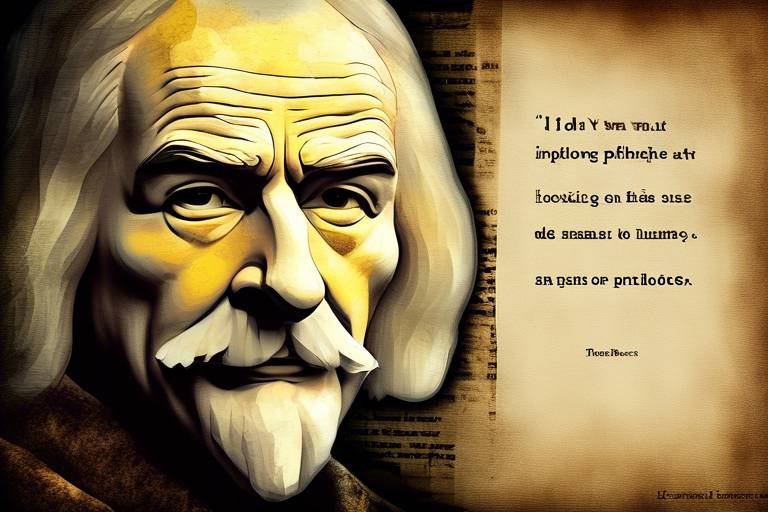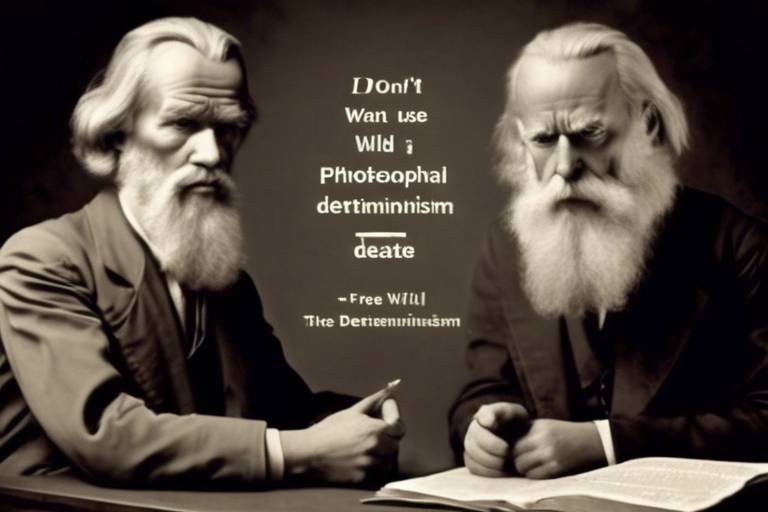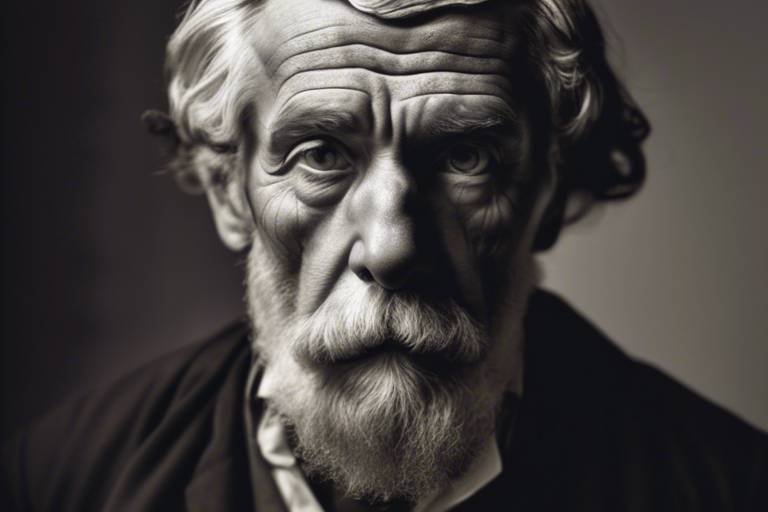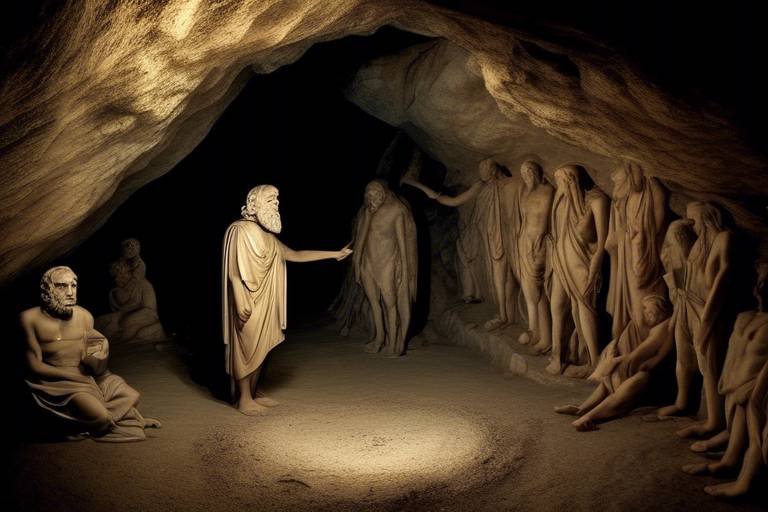The Philosophy of Ultimate Reality: Dealing with Metaphysics
Welcome to the fascinating world of metaphysics, where we dive deep into the nature of existence and the fundamental questions that have puzzled humanity for centuries. What is reality? Is there something beyond what we can see and touch? These are not just philosophical musings; they are essential inquiries that shape our understanding of life and consciousness. In this article, we will explore the intricacies of metaphysics and how it relates to our perception of ultimate reality. Together, we'll journey through the thoughts of great philosophers, unraveling their ideas and examining their implications for our understanding of existence.
Metaphysics serves as a foundational branch of philosophy, examining the nature of reality beyond the physical. It delves into questions about being, existence, and the nature of objects. At its core, metaphysics seeks to answer profound questions such as: What does it mean to exist? What is the nature of objects and their properties? Is there a distinction between the material and the immaterial? These questions may seem abstract, but they are crucial in shaping our worldview. Metaphysics challenges us to think beyond the tangible, to consider the unseen forces that govern our lives. By exploring concepts like being and existence, we can better understand the complexities of our reality.
Throughout history, various philosophers have shaped metaphysical thought, each contributing unique perspectives that continue to influence our understanding of ultimate reality. Notable figures such as Aristotle, Kant, and Heidegger have left indelible marks on this field. Their inquiries have paved the way for modern metaphysical debates, challenging us to rethink what we know about existence and consciousness. For instance, Aristotle's emphasis on substance and causality laid the groundwork for understanding the nature of being, while Kant's critiques opened up new avenues for inquiry by questioning traditional assumptions. Each philosopher offers a lens through which we can examine the fundamental aspects of reality.
Aristotle's metaphysics introduced essential concepts like substance and causality, which remain pivotal in contemporary discussions. He posited that everything in existence is a composite of form and matter, where form gives something its identity and matter provides its physical substance. This duality is crucial for understanding how objects exist in the world. Aristotle's ideas on the nature of being have influenced countless philosophers and continue to spark debate today. His exploration of causality, particularly the four causes—material, formal, efficient, and final—provides a comprehensive framework for understanding change and existence.
A cornerstone of Aristotle's philosophy, the principle of non-contradiction asserts that contradictory statements cannot both be true. This principle is not merely a logical axiom; it serves as a fundamental guideline for coherent discourse in metaphysical discussions. If we allow contradictions to slip into our understanding of reality, we risk losing the very essence of meaningful inquiry. This principle invites us to critically assess our beliefs and assumptions, ensuring that our metaphysical explorations remain grounded in rational thought.
Aristotle distinguished between potentiality and actuality, explaining how things can exist in different states. Potentiality refers to the capacity for change, the possibilities that lie within an object, while actuality is the realization of those possibilities. This distinction is essential for understanding how entities evolve over time. For example, consider a seed; it has the potential to grow into a tree, but it only becomes an actual tree when it undergoes the necessary changes. This framework helps us appreciate the dynamic nature of existence and the processes that underlie change.
Immanuel Kant challenged traditional metaphysical assumptions by introducing the distinction between phenomena and noumena. Phenomena are the world as we perceive it, shaped by our senses and understanding, while noumena represent things as they are in themselves, beyond our perception. This groundbreaking distinction reshaped the landscape of metaphysical inquiry, prompting philosophers to reconsider the limits of human knowledge. Kant's work encourages us to question how much we can truly know about ultimate reality and whether our perceptions can ever fully capture it.
Modern philosophers continue to engage with metaphysical questions, often influenced by past thinkers. Current debates surrounding realism, idealism, and the nature of time and space reflect the ongoing struggle to understand ultimate reality. These discussions are not just academic; they have real implications for how we view ourselves and our place in the universe. For instance, the conflict between realism and idealism raises questions about the nature of reality itself: Is it independent of our perceptions, or is it shaped by our consciousness? These inquiries challenge us to think critically about our understanding of existence.
The conflict between realism and idealism remains central to metaphysical discussions. Realism posits that reality exists independently of our perceptions, while idealism suggests that reality is fundamentally shaped by our thoughts and consciousness. This dichotomy leads to profound implications for our understanding of the world. For instance, if realism holds true, then our perceptions are merely reflections of an objective reality. Conversely, if idealism is correct, then our thoughts play a crucial role in shaping the very fabric of existence. This ongoing debate invites us to explore the nature of reality and our relationship to it.
The metaphysical nature of time raises profound questions about existence and change. Is time linear, moving from past to present to future, or is it cyclical, repeating in endless loops? Various theories of time, including presentism and eternalism, offer different perspectives on this enigmatic concept. Presentism argues that only the present moment is real, while eternalism posits that all points in time—past, present, and future—exist simultaneously. These theories challenge our understanding of existence and prompt us to reconsider how we perceive change and continuity in our lives.
- What is metaphysics? Metaphysics is a branch of philosophy that explores the fundamental nature of reality, including concepts like being, existence, and the nature of objects.
- Who are some key philosophers in metaphysics? Notable philosophers include Aristotle, Kant, and Heidegger, each contributing unique perspectives to the field.
- What is the principle of non-contradiction? This principle states that contradictory statements cannot both be true, serving as a foundational guideline for coherent discourse.
- What is the difference between realism and idealism? Realism posits that reality exists independently of our perceptions, while idealism suggests that reality is shaped by our consciousness.
- What are presentism and eternalism? Presentism argues that only the present moment is real, while eternalism posits that all points in time exist simultaneously.

Understanding Metaphysics
Metaphysics is like the grand stage on which the play of existence unfolds, a foundational branch of philosophy that dares to ask the most profound questions about the nature of reality beyond what we can see and touch. Imagine standing at the edge of a vast ocean of thought, where every wave represents a different concept waiting to be explored. At its core, metaphysics investigates being, existence, and the essence of objects, challenging us to ponder what it truly means to exist. It’s not just about the physical world; it’s about the underlying principles that govern everything we perceive.
To grasp the essence of metaphysics, we must dive into its key concepts. One of the primary inquiries is about being: What does it mean to be? This question leads us to consider the nature of existence itself. Are we merely physical entities, or is there something more? Metaphysics invites us to explore the idea that existence can encompass both tangible and intangible realities. For instance, while we can touch a tree or feel the warmth of the sun, can we also grasp the concepts of love or justice? These abstract notions are just as real in their implications, even if they lack a physical form.
Another critical aspect of metaphysics is the study of objects and their properties. What constitutes an object? Is it merely a collection of atoms, or does it possess an identity that transcends its physical components? This inquiry leads us to the distinction between substance and attributes. A substance is something that exists independently, while attributes are the characteristics that define it. For example, a car is a substance, but its color, make, and model are attributes that help us understand it better.
Moreover, metaphysics delves into the relationships between objects and their existence. This is where the concept of causality comes into play. What causes one event to lead to another? Understanding these connections helps us make sense of the world around us. It’s like piecing together a puzzle where each piece represents a different event or object, and our task is to uncover how they fit together to form a complete picture of reality.
In summary, metaphysics is not just an abstract discipline; it’s a vital part of our quest to understand the universe and our place within it. It challenges us to think deeply about the fundamental nature of reality, urging us to question our assumptions and explore the myriad possibilities that lie beyond the surface of our everyday experiences. As we continue this journey through metaphysics, we’ll encounter the thoughts of pivotal philosophers who have shaped our understanding of ultimate reality, each contributing their unique perspectives to this rich tapestry of inquiry.

Key Philosophers in Metaphysics
Metaphysics, the study of what exists beyond the physical realm, has been profoundly shaped by the thoughts and theories of key philosophers throughout history. These thinkers have laid the groundwork for understanding the complexities of existence, reality, and consciousness. Their ideas have not only influenced metaphysical discussions but have also permeated various other fields, from science to theology. Let's take a closer look at some of these influential figures, starting with Aristotle, whose work remains foundational in the study of metaphysics.
Aristotle, often referred to as the father of Western philosophy, introduced essential concepts such as substance and causality. He believed that everything in the universe is made up of substances, which are the fundamental entities that exist independently. For Aristotle, understanding these substances was crucial to grasping the nature of being itself. He argued that substances possess both potentiality and actuality, which means they can exist in different states. This distinction is vital when discussing change and existence, as it allows us to comprehend how entities can evolve over time.
One of the cornerstones of Aristotle's philosophy is the principle of non-contradiction, which asserts that contradictory statements cannot both be true at the same time. This principle serves as a fundamental rule in logical reasoning and metaphysical discussions, providing a framework within which we can analyze the consistency of our beliefs about reality. Without this principle, our understanding of existence would become chaotic, leading to a breakdown in rational discourse.
Aristotle's exploration of potentiality and actuality offers a fascinating lens through which to view the world. He posited that everything has the potential to become something else, which is a powerful idea when considering the nature of existence. For instance, a seed has the potential to grow into a tree, but it only achieves this state when the right conditions are met. This concept not only enriches our understanding of change but also invites us to ponder the possibilities of our own existence and growth.
Moving forward in time, we encounter Immanuel Kant, who boldly challenged traditional metaphysical assumptions. In his seminal work, Critique of Pure Reason, Kant introduced a crucial distinction between phenomena (the world as we experience it) and noumena (the world as it exists independently of our perception). This distinction reshaped the landscape of metaphysical inquiry, forcing philosophers to reconsider the limits of human knowledge and the nature of reality. Kant's ideas invite us to ask: Can we ever truly know the essence of things, or are we forever confined to our subjective experiences?
These two philosophers, Aristotle and Kant, represent just a fraction of the rich tapestry of metaphysical thought. Others, such as Heidegger, have also made significant contributions, delving into questions of being and existence in ways that continue to resonate today. Each of these thinkers has provided unique insights that help us navigate the complex and often perplexing questions surrounding ultimate reality.
- What is metaphysics? Metaphysics is a branch of philosophy that explores the fundamental nature of reality, including concepts such as being, existence, and the nature of objects.
- Who are some key philosophers in metaphysics? Notable philosophers include Aristotle, Kant, and Heidegger, each of whom has contributed significantly to metaphysical thought.
- What is the principle of non-contradiction? This principle asserts that contradictory statements cannot both be true at the same time, serving as a foundational rule in logical reasoning.
- What is the difference between potentiality and actuality? Potentiality refers to the capacity of something to become something else, while actuality is the realization of that potential.

Aristotle's Metaphysical Framework
Aristotle, often regarded as one of the most influential philosophers in Western thought, laid the groundwork for metaphysical inquiry with his profound exploration of the nature of reality. His metaphysical framework focuses on two essential concepts: substance and causality. For Aristotle, everything that exists can be categorized as a substance, which is defined as that which exists in itself, independent of other things. This perspective invites us to consider not just what things are, but what it means for something to truly exist.
At the heart of Aristotle's metaphysical thought is the idea that substances have an essence, a fundamental quality that defines what they are. He famously articulated this through the concept of form and matter. Form represents the essence of a thing, while matter is the substance that takes on that form. To illustrate this, think of a statue: the marble (matter) takes on the shape of a person (form). This distinction allows us to understand that reality is not just a collection of objects but a complex interplay of forms and their material counterparts.
Moreover, Aristotle introduced the principle of causality, which examines how things come into being and change. He identified four types of causes that explain why a thing is the way it is:
- Material Cause: The substance out of which something is made.
- Formal Cause: The form or essence of a thing.
- Efficient Cause: The agent or force that brings something into existence.
- Final Cause: The purpose or end for which a thing exists.
This framework not only provides a comprehensive understanding of existence but also emphasizes the dynamic nature of being. For Aristotle, change is not merely an illusion; it is a fundamental aspect of reality. He distinguished between potentiality and actuality, asserting that everything has the potential to become something else. For instance, an acorn has the potentiality to become an oak tree, but it is only when it grows and develops that it achieves actuality. This distinction is crucial for understanding how entities evolve over time and how they interact with their environment.
Aristotle's contributions to metaphysics have left an indelible mark on philosophical thought, influencing countless scholars and thinkers throughout history. His ideas continue to resonate today, prompting modern philosophers to engage with his concepts in new and innovative ways. By examining the interplay of substance, form, matter, and causality, we gain deeper insights into the very nature of existence and the complexities of reality.
What is Aristotle's concept of substance?
Aristotle defines substance as that which exists in itself, serving as the fundamental building block of reality. It encompasses both the matter and form of an entity.
How does Aristotle's idea of causality differ from modern views?
Aristotle's causality includes four types of causes, whereas modern views often focus on efficient causes, emphasizing the relationships between events and their outcomes.
Why is the distinction between potentiality and actuality important?
This distinction helps us understand how entities can change and develop over time, highlighting the dynamic nature of existence.

The Principle of Non-Contradiction
The Principle of Non-Contradiction is one of the most fundamental tenets in Aristotle's philosophy, and it states that contradictory statements cannot both be true at the same time and in the same sense. To put it simply, if we say "A is B" and "A is not B" simultaneously, we are stepping into a realm of confusion that defies logical reasoning. This principle is crucial for establishing a coherent framework of understanding in metaphysics and lays the groundwork for rational discourse. Without this principle, every conversation would devolve into chaos, as we would be unable to distinguish between truth and falsehood.
Imagine trying to build a house without a solid foundation; it would collapse under the slightest pressure. Similarly, the Principle of Non-Contradiction serves as the bedrock of logical reasoning. It allows us to articulate thoughts, engage in meaningful discussions, and develop theories about the nature of reality. Aristotle emphasized that this principle is not just a rule of logic but a reflection of the way things actually are in the world. If we accept that contradictions can exist, we open the door to absurdities that undermine our understanding of existence.
In contemporary philosophy, this principle remains a point of contention. Some postmodern thinkers challenge its validity, suggesting that reality is more fluid and subjective than Aristotle proposed. However, even in these debates, the principle often resurfaces as a point of reference. For instance, when discussing conflicting worldviews or ethical systems, one must grapple with the implications of contradictory beliefs. The very act of debating requires an acknowledgment of some level of consistency, which is inherently tied to the Principle of Non-Contradiction.
To further illustrate its significance, consider the following examples:
- If we assert that "the sky is blue," we cannot simultaneously claim "the sky is not blue" without specifying different contexts or conditions.
- In legal terms, a defendant cannot be both guilty and not guilty of a crime at the same time in the same context.
In both cases, the principle helps us navigate complex discussions and reach conclusions that are logically sound. Thus, while some may argue for a more nuanced understanding of reality, the Principle of Non-Contradiction remains an essential tool for philosophers and thinkers alike. It not only aids in clarifying our thoughts but also reinforces the importance of logical consistency in our pursuit of knowledge.
- What is the Principle of Non-Contradiction?
It is a fundamental principle in logic that states contradictory statements cannot both be true at the same time and in the same sense. - Why is this principle important in metaphysics?
It provides a foundation for coherent discourse and helps distinguish between truth and falsehood, making it essential for philosophical inquiry. - Who introduced the Principle of Non-Contradiction?
The principle was notably articulated by Aristotle in his work on logic and metaphysics. - Can the Principle of Non-Contradiction be challenged?
Yes, some postmodern philosophers argue against its absolute validity, suggesting that reality may be more subjective.

Potentiality and Actuality
When we dive into the concepts of potentiality and actuality, we're stepping into a rich philosophical landscape that Aristotle meticulously laid out. Imagine a seed buried in the soil. It holds within it the potential to become a magnificent tree, but until it is nurtured and allowed to grow, it remains merely a seed. This analogy beautifully encapsulates Aristotle's distinction between potentiality and actuality. Potentiality refers to the inherent capacity for change or development, while actuality is the realization of that potential.
Aristotle argued that everything in the universe exists in a state of potentiality until it undergoes a process of change that leads to its actualization. For example, consider a sculptor with a block of marble. The marble has the potential to become a stunning statue, but it remains just a block until the sculptor chisels away at it, transforming it into a work of art. This process of transformation is crucial for understanding how existence operates in the physical world.
To further clarify these concepts, let’s break them down into key components:
- Potentiality: The capacity to develop into a certain state or form. It’s like having a dream or a goal; it exists in your mind, waiting for the right conditions to bring it to life.
- Actuality: The state of being real or existing. This is when those dreams or goals manifest into reality, much like the moment a butterfly emerges from its chrysalis.
Understanding the relationship between potentiality and actuality helps us grapple with the notion of change. In essence, change is the bridge that connects what can be with what is. Without this dynamic interplay, the universe would be static and devoid of the vibrant diversity we see around us. Aristotle’s insights into these concepts have profound implications, not just in metaphysics but also in science, ethics, and even personal development.
For instance, in the realm of ethics, one might argue that a person has the potential to grow and change morally. However, without the right experiences or choices, that potential remains unrealized. This idea resonates with many of us, as we often find ourselves at crossroads, deciding whether to pursue our potential or remain in our current state.
In conclusion, the concepts of potentiality and actuality are not just abstract ideas; they are fundamental to understanding our existence and the world around us. They remind us that while we may have untapped potential within us, it is through action and change that we can bring that potential into actuality. This understanding can inspire us to strive for growth and transformation in our lives, much like the seed that becomes a tree or the sculptor who reveals beauty from stone.
- What is the difference between potentiality and actuality? Potentiality refers to the capacity for something to develop or change, while actuality is the realization of that potential.
- How do these concepts relate to personal growth? They highlight that while we may have inherent potential, it takes action and change to realize that potential in our lives.
- Can potentiality and actuality apply to abstract concepts? Yes, they can apply to ideas, dreams, and even moral development, emphasizing the importance of transformation.

Kant's Critique of Pure Reason
Immanuel Kant's Critique of Pure Reason is a monumental work that fundamentally challenged the existing frameworks of metaphysical thought in the 18th century. At the heart of Kant's philosophy lies the distinction between phenomena and noumena. Phenomena refer to the world as we experience it—our perceptions, thoughts, and the sensory information we gather. In contrast, noumena represent the things-in-themselves, the reality that exists independently of our perception. This crucial distinction reshaped the way philosophers approach metaphysical inquiries, as Kant argued that while we can know phenomena, noumena remain largely inaccessible to human cognition.
Kant posited that our understanding of reality is filtered through the lens of our senses and cognitive faculties. This means that our grasp of existence is inherently limited. He famously stated, "Thoughts without content are empty, intuitions without concepts are blind." This phrase encapsulates his view that both sensory experience and rational thought are essential for knowledge. Consequently, Kant's work emphasizes the importance of human perception in constructing our understanding of reality, suggesting that we cannot simply rely on pure reason to grasp the ultimate nature of existence.
Furthermore, Kant's critique introduced the idea of transcendental idealism, which posits that while we can have knowledge of the world as it appears to us, the true essence of reality remains beyond our reach. This perspective invites a fascinating exploration of how our cognitive structures shape our understanding of the universe. Kant argued that space and time are not inherent properties of objects in the world but rather forms of intuition that structure our experience. This leads us to ponder: Are we merely passive observers of reality, or do we actively construct it through our perceptions?
To illustrate Kant's impact on metaphysical thought, consider the following table that summarizes key aspects of his critique:
| Concept | Description |
|---|---|
| Phenomena | The world as we perceive it; our sensory experiences and thoughts. |
| Noumena | The reality that exists independently of our perception; the things-in-themselves. |
| Transcendental Idealism | The belief that our understanding of reality is shaped by our cognitive structures. |
| Forms of Intuition | Space and time as frameworks through which we experience the world. |
Kant's exploration of the limits of human understanding not only sparked a wave of philosophical inquiry but also laid the groundwork for subsequent thinkers to grapple with the implications of his ideas. His critique has led to ongoing debates about the nature of reality, knowledge, and existence, influencing modern metaphysical discussions profoundly. As we delve deeper into these themes, we are left with lingering questions about our place in the universe and the very essence of reality itself.
- What is the main argument of Kant's Critique of Pure Reason? Kant argues that our understanding of reality is limited to phenomena, the world as we perceive it, while the noumena, or things-in-themselves, remain inaccessible to human cognition.
- How did Kant's ideas impact metaphysics? Kant's work challenged traditional metaphysical assumptions, emphasizing the role of human perception and cognition in shaping our understanding of reality.
- What is transcendental idealism? Transcendental idealism is the view that our knowledge of the world is constructed through our cognitive faculties and that space and time are not inherent properties of objects but forms of intuition.

Contemporary Metaphysical Debates
In the ever-evolving realm of philosophy, have taken center stage, engaging thinkers who grapple with questions that have puzzled humanity for centuries. These discussions often draw from the rich tapestry of past philosophical insights while addressing modern concerns and advancements. One of the most compelling aspects of these debates is the tension between realism and idealism, two opposing perspectives that seek to define the nature of reality itself.
The conflict between realism and idealism is not just a dry academic exercise; it resonates deeply with our everyday experiences and perceptions. Realism posits that the world exists independently of our thoughts and perceptions, suggesting that objects and events have an existence that is not contingent upon our awareness. On the other hand, idealism argues that reality is fundamentally shaped by our consciousness and perceptions. This dichotomy raises significant questions: Can we ever truly know the world as it is, or are we forever trapped in our subjective interpretations?
As we dive deeper into these debates, we encounter various theories of time, which further complicate our understanding of existence. The metaphysical nature of time is a hot topic, prompting questions such as: Is time a linear progression from past to future, or is it a more complex, non-linear phenomenon? Two prominent theories come into play here: presentism and eternalism. Presentism asserts that only the present moment is real, while the past and future are mere abstractions. In contrast, eternalism posits that all points in time—past, present, and future—exist simultaneously. This debate not only challenges our perception of time but also influences how we understand change and existence itself.
In addition to these foundational debates, contemporary metaphysics also wrestles with the implications of scientific advancements. For instance, the rise of quantum mechanics has led to new discussions about the fundamental nature of reality. Does the behavior of subatomic particles support a realist view, or does it lean towards idealism? As scientists uncover more about the universe, philosophers are left to interpret these findings, often leading to a fascinating intersection of science and philosophy.
Moreover, the influence of technology and digital realities cannot be overlooked. With the advent of virtual reality and artificial intelligence, questions arise about the nature of existence in a digital age. Are these digital constructs real? How do they affect our understanding of consciousness and self? These questions push the boundaries of traditional metaphysical inquiry, inviting new perspectives and challenges.
In summary, contemporary metaphysical debates are rich and varied, reflecting the complexities of modern existence. As we continue to explore the nature of reality, consciousness, and time, we find ourselves at the intersection of philosophy, science, and technology. This ongoing dialogue not only enriches our understanding of the universe but also invites us to reflect on our place within it.
- What is metaphysics? Metaphysics is a branch of philosophy that studies the fundamental nature of reality, including concepts such as being, existence, and the nature of objects.
- What are the main debates in contemporary metaphysics? Key debates include realism vs. idealism, the nature of time, and the implications of scientific advancements on our understanding of reality.
- How do realism and idealism differ? Realism asserts that the world exists independently of our perceptions, while idealism claims that reality is shaped by our consciousness and perceptions.
- What are presentism and eternalism? Presentism posits that only the present is real, while eternalism argues that all points in time exist simultaneously.
- How does technology influence metaphysical debates? The rise of virtual reality and AI challenges traditional notions of existence and consciousness, prompting new philosophical inquiries.

Realism vs. Idealism
The debate between realism and idealism is one of the most intriguing and enduring discussions in metaphysics. At its core, realism posits that the world exists independently of our perceptions and thoughts. In contrast, idealism suggests that reality is fundamentally shaped by our consciousness and perceptions. This clash of perspectives raises profound questions about the nature of existence and our understanding of reality.
Realists argue that objects and events exist in a manner that is not contingent upon human thought. For example, a tree remains a tree whether or not anyone is present to observe it. This perspective aligns with a more scientific approach, emphasizing that there is an objective reality that can be studied and understood. On the other hand, idealists contend that our experiences and perceptions are the primary components of reality. They argue that without a mind to perceive it, the concept of the tree loses its significance. This leads to a fascinating inquiry: if reality is shaped by our perceptions, can we ever truly know it?
To illustrate the differences between these two philosophies, consider the following table:
| Aspect | Realism | Idealism |
|---|---|---|
| Definition | Reality exists independently of perception. | Reality is shaped by perception and consciousness. |
| Key Proponents | Aristotle, Bertrand Russell | George Berkeley, Immanuel Kant |
| View of Objects | Objects have an existence outside of human thought. | Objects are dependent on being perceived. |
| Scientific Approach | Supports empirical investigation and objectivity. | Encourages exploration of subjective experiences. |
This philosophical dichotomy extends beyond mere definitions; it influences how we approach various fields, including science, ethics, and even art. For instance, a realist might argue that scientific laws exist regardless of human interpretation, while an idealist might emphasize the role of human experience in shaping scientific understanding. This leads us to ponder: can we separate our experiences from the objective world, or are they inextricably linked?
Moreover, the implications of this debate can be seen in everyday life. Consider how we perceive beauty. A realist might argue that beauty exists in the world, independent of our perceptions, while an idealist might claim that beauty is entirely subjective and varies from person to person. This raises further questions about the nature of truth and whether it can be universally defined or is merely a construct of individual perception.
As we navigate through these philosophical waters, it's essential to recognize that both realism and idealism offer valuable insights into the human experience. They challenge us to consider the balance between objective reality and subjective perception, pushing the boundaries of our understanding. In a world where the lines between these two perspectives often blur, the quest for ultimate reality continues to inspire both philosophical inquiry and personal reflection.
- What is realism? Realism is the philosophical viewpoint that objects and events exist independently of our perceptions.
- What is idealism? Idealism is the belief that reality is fundamentally shaped by our consciousness and perceptions.
- How do realism and idealism differ? Realism asserts an objective reality, whereas idealism emphasizes the role of perception in shaping reality.
- Can we ever know objective reality? This is a central question in the realism vs. idealism debate, with differing opinions on the extent of our knowledge.

The Nature of Time
The metaphysical nature of time is one of those mind-bending topics that can leave you feeling like you're trying to catch smoke with your bare hands. Have you ever wondered if time is something that exists independently of us, or is it merely a construct of our consciousness? Philosophers have debated this for centuries, and their discussions reveal just how complex and intriguing the concept of time really is.
At its core, time can be understood in a few different ways, each offering a unique perspective on its nature. Two prominent theories that often come up in philosophical debates are presentism and eternalism. Presentism posits that only the present moment is real, while the past and future are mere illusions. In contrast, eternalism suggests that all points in time—past, present, and future—are equally real, akin to viewing time as a vast landscape where every moment exists simultaneously. This leads us to ponder: if the future is already laid out, do we truly have free will?
To further complicate matters, the concept of time is often intertwined with our understanding of change. As we experience life, we perceive time as a sequence of events, a continuous flow from one moment to the next. Yet, if we think about it, can we really say that time flows? Or is it simply our perception that gives us the impression of movement? This brings us to the idea of time as an illusion, where some philosophers argue that our experience of time is just a trick of the mind, shaped by our memories and anticipations.
Moreover, time is not just a philosophical debate; it has practical implications in our everyday lives. Consider how we organize our schedules, plan for the future, and reflect on the past. Time influences our decisions, relationships, and even our sense of identity. When we think about our lives, we often frame our experiences within a temporal context: "Last year, I traveled to Europe," or "In five years, I hope to be in a different career." This temporal framing shapes our narratives and gives structure to our existence.
Perhaps one of the most fascinating aspects of time is how different cultures perceive it. For instance, in many Western societies, time is often viewed linearly, moving from past to present to future. However, in some Eastern cultures, time is seen as cyclical, where events repeat and history is not just a series of isolated incidents but part of a larger, ongoing process. This divergence in understanding can lead to vastly different worldviews, influencing everything from personal goals to societal structures.
In conclusion, the nature of time is a profound topic that invites us to question our assumptions and explore the depths of our understanding. Whether we see time as a flowing river or a static landscape, one thing is certain: it shapes our reality in ways we may not even fully grasp. So the next time you glance at the clock or reflect on your past, take a moment to ponder the mysteries of time—it's more than just numbers on a face; it's a fundamental aspect of our existence.
- What is presentism? Presentism is the philosophical theory that only the present moment is real, while the past and future do not exist.
- What does eternalism propose? Eternalism suggests that all points in time—past, present, and future—are equally real, much like a landscape where every moment exists simultaneously.
- How does culture influence our perception of time? Different cultures can have varying views of time, with some seeing it as linear and others as cyclical, impacting their worldview and societal norms.
Frequently Asked Questions
- What is metaphysics?
Metaphysics is a branch of philosophy that explores the fundamental nature of reality. It goes beyond the physical world to examine concepts like being, existence, and the nature of objects. Think of it as the philosophical quest to understand what lies beneath the surface of our everyday experiences.
- Who are some key philosophers in metaphysics?
Throughout history, several influential philosophers have shaped metaphysical thought. Notable figures include Aristotle, who introduced essential concepts such as substance and causality, and Immanuel Kant, who challenged traditional views by distinguishing between phenomena and noumena. Their ideas continue to resonate in contemporary metaphysical debates.
- What is Aristotle's principle of non-contradiction?
The principle of non-contradiction is a fundamental tenet in Aristotle's philosophy, stating that contradictory statements cannot both be true at the same time. This principle is crucial for maintaining logical consistency in metaphysical discussions and helps clarify our understanding of reality.
- How does Aristotle define potentiality and actuality?
Aristotle distinguishes between potentiality and actuality to explain how things can exist in different states. Potentiality refers to the capacity for change or development, while actuality is the realization of that potential. This distinction is key to understanding how entities evolve and exist over time.
- What was Kant's critique of pure reason?
Kant's critique of pure reason challenged traditional metaphysical assumptions by introducing the distinction between phenomena (the world as we experience it) and noumena (the world as it is in itself). This groundbreaking work reshaped metaphysical inquiry, prompting philosophers to reconsider the limits of human understanding.
- What are the current debates in metaphysics?
Modern metaphysical debates often revolve around topics like realism versus idealism, the nature of time, and the existence of abstract entities. These discussions are influenced by historical thinkers and continue to evolve as philosophers seek to address fundamental questions about existence and reality.
- What is the difference between realism and idealism?
Realism posits that the world exists independently of our perceptions, while idealism suggests that reality is mentally constructed or immaterial. This ongoing conflict shapes metaphysical discussions and influences how we understand the nature of reality itself.
- What theories exist regarding the nature of time?
The metaphysical nature of time raises profound questions, leading to various theories such as presentism (only the present is real) and eternalism (past, present, and future are equally real). These theories explore how we perceive change and existence, impacting our understanding of reality.



















